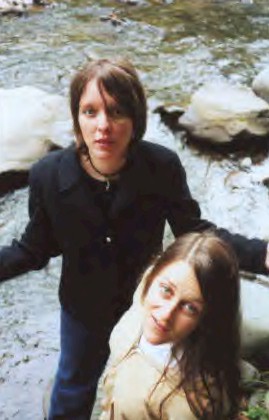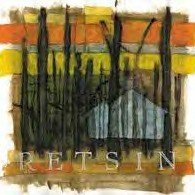|

Retsin
cabin in the woods
by tim mcmahan
|
|
|
May 19
Retsin
k.
Fizzle Like a Flood
Sokol Underground
13th and Martha
9 p.m.
Lazy-i: May 16, 2001
|
Here's an example of just how far off
someone's (in this case, mine) interpretation of a song can be from its
real meaning.
I'm listening to the new CD by Retsin, the duo of Tara Jane O'Neil and
Cynthia Nelson, who will be adorning the Sokol Underground stage May 19
with their friend, Karla Schickele (Ida, Beekeeper) performing as K. and
Omaha one-man-band songster Fizzle Like a Flood.
Retsin's CD, just out on Carrot Top Records, is called Cabin in the
Woods and is 15 down-home, quiet acoustic gems that interplay guitar,
banjo and O'Neil and Nelson's sweet, serene harmonies. Think low-key Red
House Painters meets Low with a hint of twanging bluegrass sung by
clear-voiced women and you start to get the picture.
So I'm listening to the CD and on comes track 5, "Land of the
Lost." It opens with what sounds like a haunting slide guitar, some
acoustic strumming, the slow cowboy-song pluck-pluck-pluck of a banjo,
then Nelson's unadorned, almost girlish hangdog vocal:
The ceiling is leaking, it's leaking rust
All there's to hope for is it don't leak on us
You can hide in the corners, cover your mouth
Entertaining a thought about moving back south
I envision two young girls in night dresses, sitting crouched with arms
around their knees in the gloomy dirt-floored corner of a tin-roofed shack
somewhere in the mountains, rain pouring down, rattling like the lid on a
pot boiling over, orange water dripping rich with rust from the beaten
roof, scared and tired and wishing the rain would just stop. |
|
|
It goes on:
Heavy boots over head, stomping so heavily
It keeps raining plaster and there's just dust to breathe
Falling through floor worlds these the loudest days
But in the land of the lost, they get saved
The heavy boots? Why that must be thunder, crashing around them as
their world falls apart. Oh, why didn't they stay in Alabama! Why did they
throw it all away for a new life up north? This is surely the elegy of a
pioneer family or a recently freed slave who left behind all she knew only
to be trapped in a rural hell with nothing but rain and dust and her own
self doubts.
I explain my interpretation to Nelson during our interview conducted
hours before she and O'Neil took the main stage for a headline performance
at The Knitting Factory in New York City. I gushed at "Land of the
Lost," my favorite song from a collection seemingly filled with rich,
georgic flavored ballads, all written, performed and thoroughly influenced
by a summer the two spent in a cabin in upstate New York.
"Oh, that one wasn't recorded in the cabin," Nelson said,
instantly deflating me. "We recorded it in our apartment in New York
City, before we left. That song is about one of the situations that
inspired us to leave -- we were in our apartment when they were renovating
the apartment upstairs. All that noise and dust, it was awful."
So much for the pre-Civil War escaped indentured servant theory.
"Most people tend to put their own vision on our music," she
says, consoling me. |

|
"It was the kind of place
where you could find a snake inside your newspaper or where a mouse
would eat through a phone line, and at night it was so quiet outside
and so dark. " |
|
|
|
|
"Most people tend to
put their own vision on our music." |
|
|
O'Neil and Nelson have been performing as
Retsin since 1994, releasing four albums of self-described quirky,
emotional pop songs. For years they toured as a four-piece, "The
Retsin Good Times Band." But after being unable to find the right
musicians to fill out their sound, they shifted and simplified, touring
the United States with two acoustic guitars and their two voices for two
years.
On the new CD, they add banjo, flute, accordion, violin and Old English
ballad sounds in an effort to create a hazy, wooded, pastoral world. Guest
performers include Ida Pearle and Liz Mitchell (who perform together as
Ida). O'Neil used home recording techniques to capture the acoustic
instruments bouncing off the old cabin's A-frame wood ceiling.
"We used as much of the country as we could, listening to old-time
folk music and living in the woods, observing animals," Nelson said.
"We weren't super-isolated. The cabin was sort of like a small house
with a nice deck. It was more about the environment than the actual
structure. It had the right flavor. It was the kind of place where you
could find a snake inside your newspaper or where a mouse would eat
through a phone line, and at night it was so quiet outside and so
dark."
The escape from New York was provoked by the duo getting kicked out of
their apartment. "We were burned out by living in the city," she
said. "It was cramped. We wanted a little more beauty and space. We
were asking around and found the summer cabin available for six months,
which just happened to be the time we planned on recording.
If they hadn't gotten the cabin, the CD would have been recorded in a
New York City apartment (presumably called Apartment in the City?)
and would have sounded a lot different, she said. "I can hear that
cabin and feel the woods and the situation we were living in every time I
play it."
With the cabin now long behind them, Nelson said the couple was offered
a free house to stay in -- an empty, two-room beige condo that will be
used mostly as a storage facility in the coming months.
"We plan on doing a lot of touring this year," she said.
"This tour will last seven weeks, and we'll be busy with other
projects. Tara has been recording a solo record and I've been writing a
bunch of poems, trying to make a new book."
Nelson has written three books of poetry, including 1998's "The
Kentucky Rules," all of which have been published by Soft Skull
Press, a publishing house based in New York City's Lower East Side, known
for printing "fearless, progressive, punk-rock/hip-hop
literature."
Back to 
Published in The Omaha Weekly May 16, 2001. Copyright ©
2001 Tim
McMahan. All rights reserved. |
|
|

![]() webboard
interviews
webboard
interviews